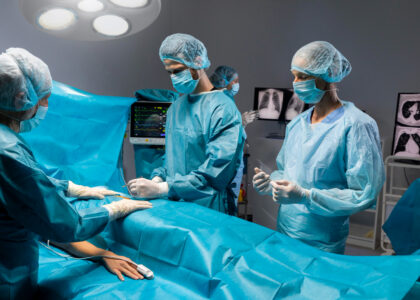Crucial ICU Interventions That Save Life
When a patient is in a critical condition, intensive care is vital for saving life. The Intensive Care Unit (ICU) serves as a lifeline for critically ill patients, offering a spectrum of interventions that can make the difference between life and death. Multispecialty hospitals, equipped with a diverse team of healthcare professionals, play a pivotal role in providing comprehensive care to patients in need. Here are some life-saving ICU interventions available at GKM Hospital that help patients tide over emergencies to recover their life and lifestyle.
Advanced Ventilatory Support:
The ability to breathe is fundamental to life, and for patients in critical condition, advanced ventilatory support becomes a lifeline. GKM Hospital is equipped with state-of-the-art ventilators operated by skilled respiratory therapists and critical care physicians. These devices can assist or completely take over a patient’s breathing, ensuring adequate oxygenation and ventilation.
H emodynamic Monitoring:
Maintaining optimal blood flow is crucial for organ function. In our ICU, hemodynamic monitoring allows healthcare professionals to assess a patient’s cardiovascular status in real-time. This involves tracking parameters such as blood pressure, heart rate, and cardiac output. These measurements enable us to make swift interventions to prevent organ failure and improve overall outcomes.
Renal Replacement Therapy:
Kidney function is vital for maintaining fluid and electrolyte balance. In cases of severe renal failure, we are equipped with renal replacement therapy, including haemodialysis and continuous renal replacement therapy. These interventions help remove waste products and excess fluid, promoting the restoration of kidney function.
Neurocritical Care:
Patients with neurological emergencies require specialized care. At GKM Hospital the ICU units are staffed by specialists in neuro medicine. Interventions such as intracranial pressure monitoring, neuroimaging, and neuroprotective measures are employed to manage conditions like traumatic brain injuries and strokes.
Sepsis Management:
Sepsis is a life-threatening condition that arises from the body’s extreme response to an infection. Prompt recognition and intervention are critical. At GKM Hospital we implement sepsis bundles, including early administration of antibiotics, fluid resuscitation, and close monitoring. These interventions can significantly improve survival rates.
Comprehensive Infection Control:
Infections can pose a significant threat to patients in the ICU. We at GKM Hospital implement rigorous infection control measures to minimize the risk of healthcare-associated infections. Strict hygiene practices, antimicrobial stewardship, and regular surveillance contribute to maintaining a safe environment for critically ill patients.
Nutritional Support:
Adequate nutrition is paramount for healing. In our ICU, patients who have difficulty eating, are provided specialized nutritional support. Our dietitians tailor nutrition plans to meet individual patient needs, ensuring they receive the essential nutrients required for recovery.
The ICU of a multispecialty hospital serves as a hub for life-saving interventions, bringing together a diverse array of medical specialties to provide comprehensive care. The advancements in technology, coupled with the expertise of healthcare professionals, create an environment where critical conditions can be effectively managed, ultimately saving lives and promoting a higher quality of life for those in need.
As medical science continues to evolve, we at GKM Hospital remain at the forefront, dedicated to providing life-saving critical care to enhance the potential for positive patient outcomes.





